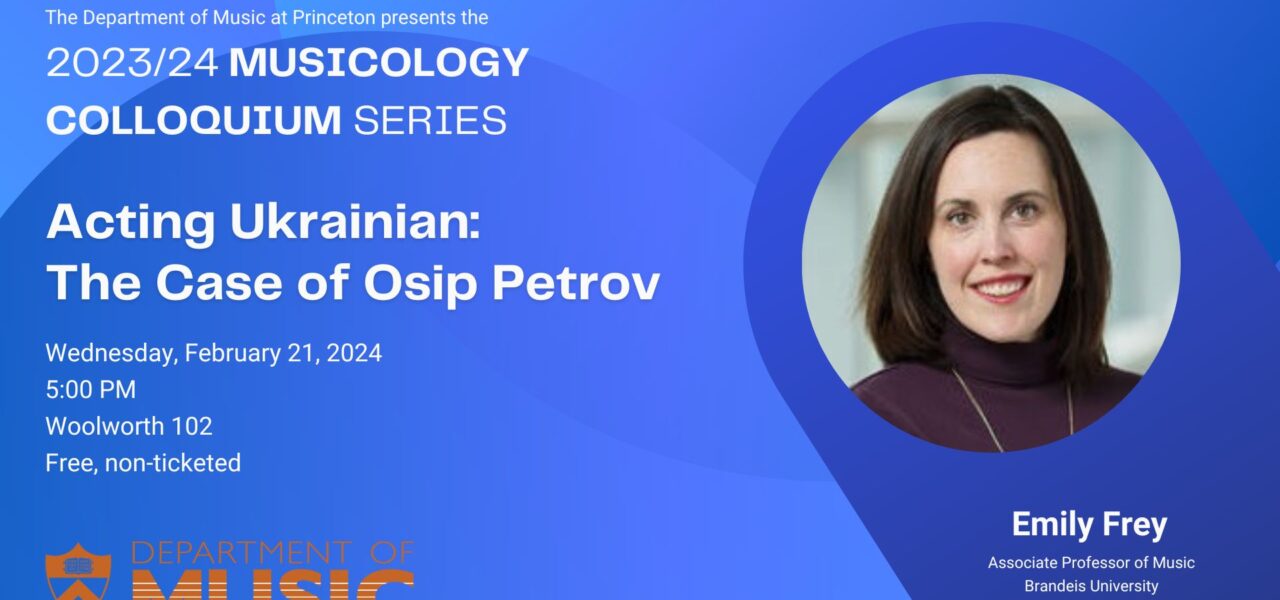Please consult our COVID-19 policies and resources for guidance on attending public performances.

Musicology Colloquium: Emily Frey
Presented by Musicology Colloquium Series
date & time
Wed, Feb 21, 2024
5:00 pm - 7:00 pm
ticketing
Free and Unticketed
- This event has passed.

Emily Frey is Assistant Professor of Music at Brandeis University. Originally from rural New Jersey (which does, in fact, exist), Emily received her B.A. in Russian literature and music from Amherst College. She completed her M.Phil. in musicology at Cambridge University and her Ph.D. in music history and literature at the University of California, Berkeley, where her research on opera and psychological prose in 1870s Russia was awarded an Alvin H. Johnson/AMS 50 Dissertation Fellowship. Emily’s publications include articles in the Journal of the American Musicological Society, 19th-Century Music, Rimsky-Korsakov and His World,Rachmaninoff and His World, and The Cambridge History of Music Criticism. She is currently finishing her first book, Opera and Realism in the Russian Empire.
Acting Ukrainian: The Case of Osip Petrov
Emily Frey, Brandeis University
“[The bass] Osip Petrov is one of the founders of the Russian operatic tradition,” proclaimed Vladimir Stasov at the singer’s fifty-year jubilee in 1876. Hyperbole is to be expected on such occasions, especially coming from so practiced a propagandist as Stasov. Yet there is reason to take this statement seriously. Osip Petrov’s stage career spanned an improbable 52 years, and he created major bass roles in nearly every Russian opera between A Life for the Tsar and Boris Godunov. Musicologists are long accustomed to imagining the history of nineteenth-century Russian music as a story of factions and rivalries: the kuchka versus the conservatory, the nationalists versus the cosmopolitans. But if, between the late 1820s and the late 1870s, you went to see an opera by Glinka, Dargomyzhsky, Serov, Rubinstein, Musorgsky, Chaikovsky, or Rimsky-Korsakov, you were likely to see Osip Petrov in a leading role. For nineteenth-century audiences, Russian opera must have sounded like Osip Petrov, regardless of who wrote the notes.
The original “great Russian bass” – progenitor of a lineage that came to include Fyodor Chaliapin, Boris Christoff, and many others – was not ethnically Russian. Born Iosyp Opanasovych in Yelysavethrad, Petrov was a Ukrainian merchant’s son who began his career in the provincial theaters of Poltava, Kharkiv, and Mykolaiv. There, he performed both singing and speaking roles, in both Russian and Ukrainian. He distinguished himself as what we might call a character actor, assuming comedic roles in such works as Ivan Kotliarevsky’s Natalka-Poltavka: an early monument of Ukrainian nationalism that is sometimes regarded as a rebuttal to Russian depictions of “little Russian” life. In his journeyman years on provincial stages Petrov was known, above all, for his precise declamation, his talent for blending comedy with pathos, and his “true-to-life” depiction of Ukrainian social types. Mutatis mutandis, these features would become leitmotifs of Osip Petrov’s later reception, after his transition from Ukrainian actor to Russian singer. They are also key ingredients in our understanding of Russian musical realism writ large.
What was the relationship between Ukrainian provincial theatre and Russian musical realism, as embodied in the operatic performances of Osip Petrov? This question may seem obtuse, hanging as it does on two entities that scarcely figure in traditional narratives about Russian opera: Ukraine on the one hand and performers on the other. I contend that these two forgotten elements do matter, perhaps profoundly. Probing into Petrov’s background and training in 1820s Ukraine can help us connect the history of Russian opera with the history of Russian theatre – an unimaginably rich relationship that remains largely unexplored. Such a perspective can help us understand realism as something embodied, something mediated or even created by performers who not just vanishing vessels for some other author’s intentions. Considering the case of Osip Petrov, the great Russian bass from little Russia, can also help us begin to untangle some of the complexities surrounding national identity in the Russian Empire.

